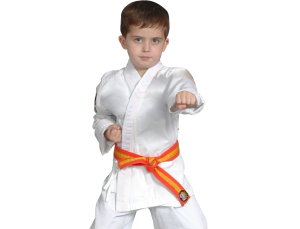By Shotokan Karate Leadership School in Santa Rosa, CA
NOTE: Names have been changed to protect the unknowing parents and the innocent child.
Four years before coming into our school, Jill had given birth to a beautiful baby boy named Johnny. Robert and Jill had held off having children until they had established their careers. Jill was 38, Robert was 41 and Johnny was their first child.

Johnny had seen martial arts in a cartoon and had taken a liking to it. Jill had heard that a good martial arts school would teach self-control to a child prone to angry outbursts, and instill confidence in one who was shy. They wanted to give karate training a try. So they brought him to our school with the hope that this nightmare would end soon, and that they could get the happy child they had dreamed about.
Jill and Robert believed that the problem was with their son. They wanted him to become independent so they were letting him have a say in family decisions. Jill believed that using her position as the mother to control her son would harm him emotionally and stunt his personal growth. Robert didn’t believe in rules. His parents were strong authoritarians who harped at him constantly about being responsible. They had rules for everything and didn’t believe in coddling their child. As a matter of fact he could only remember them telling him that they loved him once in his whole life and he didn’t want to be that kind of parent. He felt that his son needed a friend, not a disciplinarian. He wanted him to be free. So the few rules that the family had were rarely enforced.
Coming into Our School
When they came into our school, even though Johnny had been excited about taking karate, he refused to come out on the floor. Robert told us that he was ‘shy’ and then Jill asked Johnny if he wanted to take the class. Johnny continued to refuse and began to throw a tantrum. They looked at us and said they didn’t want to make him do anything he didn’t want to do. There was no doubt about it. Johnny was in charge.
The Dangers Inherent in a Permissive Parenting Style
What Jill and Robert didn’t know was that they were employing a permissive parenting style which based on their past experiences, seemed like the right thing to do. But what they didn’t know was that permissive parenting often leads to low achievement, poor decision making, displays of aggression, less understanding of emotional states, inability to manage time, poor habits, delinquency and substance abuse. They were setting Johnny up for severe emotional and psychological problems later in life.
Description of Four Different Parenting Styles
Research by Diana Baumrind from the early 1960s and later research by Maccoby and Martin suggest that there are four different parenting styles: Authoritarian, Authoritative, Permissive, and Neglectful.
Authoritarian Parenting is seen where the parents set firm rules and punish their children for breaking them. They provide no explanation of the reasoning behind the rules. The answer is “Just do it.” Very little affection is given to the child.
The Authoritative Parenting style is one in which rules are put in place but the reasoning behind the rules are given and they are enforced affectionately.
Permissive Parenting is high on nurturing but low on expectations and rules. The parents indulge their child and rarely discipline them.
The Neglectful Parent has few demands, no rules, and little or no communication or affection.
A study done by a Brigham Young University research team showed that Permissive Parenting resulted in teen binge drinking that was three times above 
The Naturalistic Observation Research Method
Naturalistic observation is a research method used by psychologists and social scientists to study subjects in their natural environment. It is a research method that we have used for 50+ years. Our conclusion is that the real students in our school are the parents.
So… is there hope for permissive parents like Jill and Robert? The answer is yes. The events of our lives can shape us in ways we don’t always know and cause us to act in ways we won’t normally have. Shotokan Karate Leadership School training will give you an insight into the impact your life events have had on you and free you to see a better way and empower you to change. Through our training you can learn to set rules in your household and enforce them with affection. Contact us if you’d like our help.
Please visit https://askaboutkarate.com/ for information about our martial arts school in Santa Rosa, CA!
